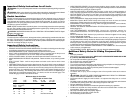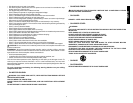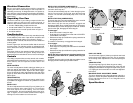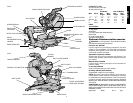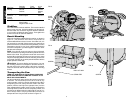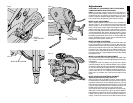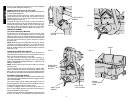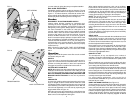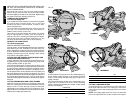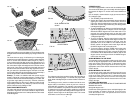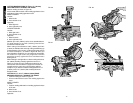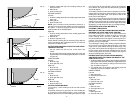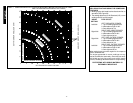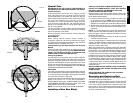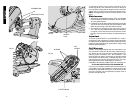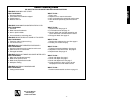
1. Position molding with top of the molding resting on the
base of the saw
2. Miter left 45°
3. Save left side of cut
OUTSIDE CORNER:
Left side
1. Position molding with bottom of molding against the base
of the saw
2. Miter right 45°
3. Save left side of cut
NOTE: If the cut must be made somewhere other than 1"
(25.4mm) from the end of the molding: cut off the molding at
90° approx. 1" (25.4mm) longer than your final length then
make the miter cut as described above.
Right side
1. Position molding with bottom of the molding against the
base of the saw
2. Miter left 45°
3. Save the right side of cut
A third method of making the cut necessary (Figure 29) is to
make a zero degree miter, 45 degree bevel cut. Your saw can
cut a bevel 12" (305mm) wide.
CUTTING BASE MOLDING LAYING FLAT AND USING
THE BEVEL FEATURE
• All cuts made with the saw set at 45° bevel and
0 miter.
• All cuts made with back of molding laying flat on the saw
and the bottom of the molding against the fence, as shown
in Figure 29.
INSIDE CORNER:
Left side
1. Bevel 45° right
2. Save right side of cut
Right side
1. Bevel 45° left
2. Save left side of cut
OUTSIDE CORNER:
Left side
1. Bevel 45° left
2. Save right side of cut
Right side
1. Bevel 45° right
2. Save left side of cut
CUTTING CROWN MOLDING
To fit properly, crown molding must be cut with extreme
accuracy.
The two flat surfaces on a given piece of crown molding are
at angles that, when added together, equal exactly 90
degrees. Most, but not all, crown molding has a top rear angle
13
English
(the section that fits flat against the ceiling) of 52 degrees
and a bottom rear angle (the part that fits flat against the
wall) of 38 degrees.
Your sliding compound miter saw has special pre-set miter
latch points at 31.6 degrees left and right for cutting crown
molding flat at the proper angle. There is also a mark on the
bevel scale at 33.9 degrees.
The chart on the next page gives the proper settings for
cutting crown molding. (The numbers for the miter and bevel
settings are very precise and are not easy to accurately set on
your saw.) Since most rooms do not have angles of precisely
90 degrees, you will have to fine tune your settings anyway.
PRETESTING WITH SCRAP MATERIAL IS
EXTREMELY IMPORTANT!
METHOD FOR CUTTING CROWN MOLDING ANGLED
BETWEEN THE FENCE AND TABLE (NESTED)
Place the molding on the table at an angle between the
fence and the saw table, as shown in Figure 31. Use of the
crown molding fence accessory (DW7084) is highly
recommended because of its degree of accuracy and con-
venience. The crown molding fence accessory is available for
purchase from your local dealer.
The advantage to cutting crown molding using this method is
that no bevel cut is required. Minute changes in the miter
angle can be made without affecting the bevel angle. This
way, when corners other than 90 degrees are encountered,
the saw can be quickly and easily adjusted for them. Use the
crown molding fence accessory to maintain the angle at
which the molding will be on the wall.
INSTRUCTIONS FOR CUTTING CROWN MOLDING
ANGLED BETWEEN THE FENCE AND BASE OF THE
SAW FOR ALL CUTS:
1. Angle the molding so the bottom of the molding (part which
goes against the wall when installed) is against the fence
and the top of the molding is resting on the base of the
saw, as shown in Figure 31.
2. The angled “flats” on the back of the molding must rest
squarely on the fence and base of the saw.
INSIDE CORNER:
Left side
1. Miter right at 45°
2. Save the right side of cut
Right side
1. Miter left at 45°
2. Save left side of cut
OUTSIDE CORNER:
Left side
1. Miter left at 45°
2. Save right side of cut
Right side
1. Miter right at 45°
2. Save left side of cut
FIG. 30
FENCE
TABLE
CROWN MOLDING FLAT ON TABLE AND AGAINST FENCE
CROWN MOLDING BETWEEN FENCE AND TABLE
FIG. 31
BACK OF
MOLDING
TABLE
TOP OF
MOLDING
FENCE
BLADE
FIG. 32
RIGHT
BOTTOM OF
MOLDING



